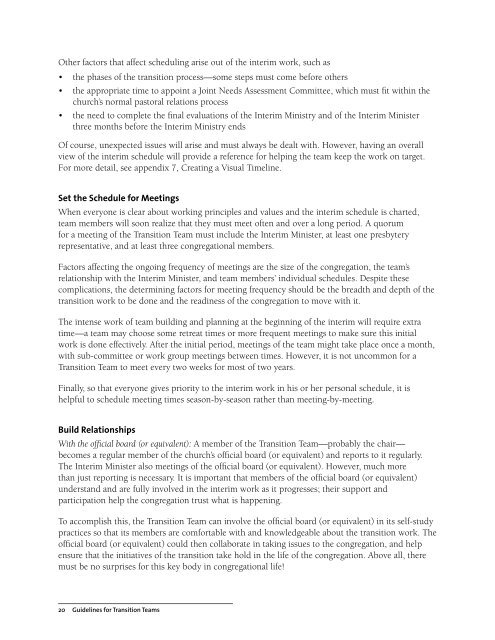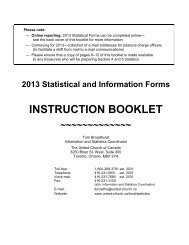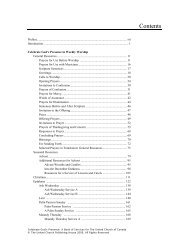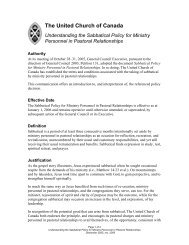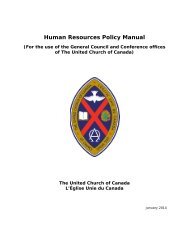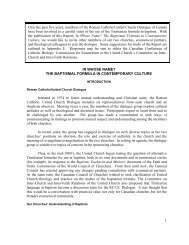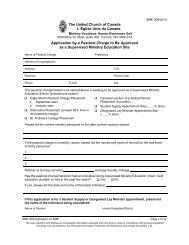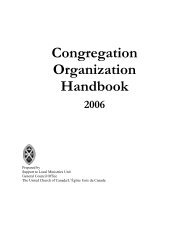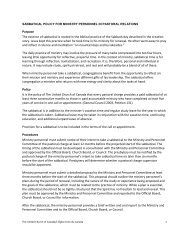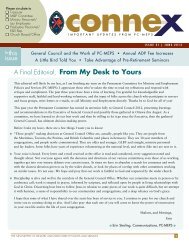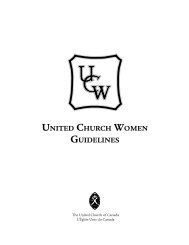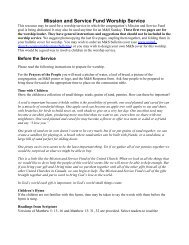Guidelines for Transition Teams - The United Church of Canada
Guidelines for Transition Teams - The United Church of Canada
Guidelines for Transition Teams - The United Church of Canada
You also want an ePaper? Increase the reach of your titles
YUMPU automatically turns print PDFs into web optimized ePapers that Google loves.
Other factors that affect scheduling arise out <strong>of</strong> the interim work, such as<br />
• the phases <strong>of</strong> the transition process—some steps must come be<strong>for</strong>e others<br />
• the appropriate time to appoint a Joint Needs Assessment Committee, which must fit within the<br />
church’s normal pastoral relations process<br />
• the need to complete the final evaluations <strong>of</strong> the Interim Ministry and <strong>of</strong> the Interim Minister<br />
three months be<strong>for</strong>e the Interim Ministry ends<br />
Of course, unexpected issues will arise and must always be dealt with. However, having an overall<br />
view <strong>of</strong> the interim schedule will provide a reference <strong>for</strong> helping the team keep the work on target.<br />
For more detail, see appendix 7, Creating a Visual Timeline.<br />
Set the Schedule <strong>for</strong> Meetings<br />
When everyone is clear about working principles and values and the interim schedule is charted,<br />
team members will soon realize that they must meet <strong>of</strong>ten and over a long period. A quorum<br />
<strong>for</strong> a meeting <strong>of</strong> the <strong>Transition</strong> Team must include the Interim Minister, at least one presbytery<br />
representative, and at least three congregational members.<br />
Factors affecting the ongoing frequency <strong>of</strong> meetings are the size <strong>of</strong> the congregation, the team’s<br />
relationship with the Interim Minister, and team members’ individual schedules. Despite these<br />
complications, the determining factors <strong>for</strong> meeting frequency should be the breadth and depth <strong>of</strong> the<br />
transition work to be done and the readiness <strong>of</strong> the congregation to move with it.<br />
<strong>The</strong> intense work <strong>of</strong> team building and planning at the beginning <strong>of</strong> the interim will require extra<br />
time—a team may choose some retreat times or more frequent meetings to make sure this initial<br />
work is done effectively. After the initial period, meetings <strong>of</strong> the team might take place once a month,<br />
with sub-committee or work group meetings between times. However, it is not uncommon <strong>for</strong> a<br />
<strong>Transition</strong> Team to meet every two weeks <strong>for</strong> most <strong>of</strong> two years.<br />
Finally, so that everyone gives priority to the interim work in his or her personal schedule, it is<br />
helpful to schedule meeting times season-by-season rather than meeting-by-meeting.<br />
Build Relationships<br />
With the <strong>of</strong>ficial board (or equivalent): A member <strong>of</strong> the <strong>Transition</strong> Team—probably the chair—<br />
becomes a regular member <strong>of</strong> the church’s <strong>of</strong>ficial board (or equivalent) and reports to it regularly.<br />
<strong>The</strong> Interim Minister also meetings <strong>of</strong> the <strong>of</strong>ficial board (or equivalent). However, much more<br />
than just reporting is necessary. It is important that members <strong>of</strong> the <strong>of</strong>ficial board (or equivalent)<br />
understand and are fully involved in the interim work as it progresses; their support and<br />
participation help the congregation trust what is happening.<br />
To accomplish this, the <strong>Transition</strong> Team can involve the <strong>of</strong>ficial board (or equivalent) in its self-study<br />
practices so that its members are com<strong>for</strong>table with and knowledgeable about the transition work. <strong>The</strong><br />
<strong>of</strong>ficial board (or equivalent) could then collaborate in taking issues to the congregation, and help<br />
ensure that the initiatives <strong>of</strong> the transition take hold in the life <strong>of</strong> the congregation. Above all, there<br />
must be no surprises <strong>for</strong> this key body in congregational life!<br />
20 <strong>Guidelines</strong> <strong>for</strong> <strong>Transition</strong> <strong>Teams</strong>


